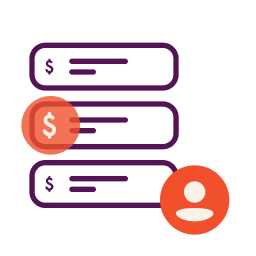
Payroll Software that maximizes efficiency and minimizes errors
A good payroll software can streamline paying employees, payroll taxes, and creating reports. And in most cases, it’s less expensive than hiring a payroll service provider. Choose one of the great options below, or sign in to Nav to see our top recommendations based on your specific business needs. So you can stop crunching numbers and get back to crushing your sales goals.
The best payroll software for your business
From user-friendly interfaces to robust reporting capabilities, this carefully curated list of the best payroll software options is designed to meet the diverse needs of businesses of all sizes.
Compare the details
Elevate your business operations with the right payroll solution. Compare prices and features, including payroll tax filing, direct deposit, benefits, payroll run limits, and pay frequencies.

Learn more about payroll software & services
Visit our resource center to get all your payroll software questions answered. Learn how payroll services work and what factors to consider when choosing a payroll solution.
All the tools you need to run your business
Quickly compare options to grow your business and build a solid foundation, with personalized recommendations along the way.

What Is Payroll Software And How Does It Work?
Gerri Detweiler
What Is A Payroll Service?
A payroll service helps a business manage the process of paying employees, including withholding taxes, paying bonuses, commissions or tips, and withholding deductions for taxes, retirement plans, health insurance or other benefits. It also helps employers file state and federal payroll taxes on time.
A payroll service may offer a completely outsourced solution that manages payroll for the employer, or payroll software to make it easier for the employer to administer payroll themselves. Some services offer a combination of self-service software with additional support as needed.
Why Is Payroll Important?
Payroll is often the largest and most important expense a small business must manage. Your employees must be paid on time and in the correct amount, not only so they stick around, but also to meet state and federal labor requirements. Payroll tax payments must be paid on time to avoid expensive penalties.
Payroll is a legal obligation as well. If you have employees—or even if you just pay yourself a salary in certain cases—you must make sure you handle payroll professionally.
Payroll mistakes can be costly. As just one example, a small business can be penalized for every W-2 form it fails to send out on time. And neglecting to pay payroll taxes can result in serious penalties.
Compare Payroll Solutions
A payroll software or service can help you save time, reduce errors, boost security and stay compliant. Use Nav to find the right payroll solution for your business.
Overview Of The Payroll Process For A Small Business With 5-25 Employees
Employees generally love payday. For those who run payroll, though, the days leading up to payday can be stressful. There are a number of steps required to properly manage payroll in your small business.
- Gather employee information. New hires will need to fill out IRS Form I-9 Employment Eligibility Verification so the employer can verify employment eligibility, as well as IRS Form W-4 Employee Withholding Certificate to withhold federal income tax from the employee’s pay. State tax forms will likely be required as well. As an employer, you’ll also need to fulfill state requirements for new-hire reporting.
- Calculate gross pay including salaries, hourly wages, bonuses, commissions and/or certain tips. You’ll also need to calculate sick pay, vacation or holiday pay, maternity or parental leave, or other types of pay as applicable.
- Calculate net pay, subtracting deductions for state and/or federal taxes (including FICA taxes; Social Security and Medicare); contributions to retirement plans, health insurance contributions, or other benefits deductions; withhold wage garnishments, or child support payments as applicable.
- Pay employees on time as required under state and federal law.
- Transmit payroll taxes to taxing authorities. In the case of FICA taxes, the employer matches and pays an amount equal to the employee’s contribution.
- Transmit payments to benefits providers, such as retirement plans or health insurance providers.
- Pay workman’s compensation, if required.
- Issue W-2s and 1099s at year end.
- Maintain payroll records for at least three years to meet Department of Labor requirements, four years to meet Internal Revenue Service requirements, and as long as required by state taxing authorities.
Failing to complete these tasks in a timely manner may result in penalties.
If your business uses independent contractors, you’ll want to make sure they are classified correctly (in other words, they aren’t actually employees). You’ll also need to collect Form W-9, Request for Taxpayer Identification Number and Certification, and you generally need to report Form 1099-NEC or 1099-MISC for total annual payments of $600 or more.
Payroll Services for Small Businesses
Small business owners have several options when it comes to running payroll including:
- DIY (manually running payroll)
- Hiring a bookkeeper, accountant, and/or CPA
- Professional Employer Organizations (PEOs)
- Full-service payroll services
- Payroll software
Dedicated services are often the most costly option, and are often used by employers with more sophisticated payroll needs.
Payroll software services, including online cloud-based software, have become very popular in recent years because they are both affordable and easy to use. If you outsource payroll to your accounting professional, they most likely use some type of payroll software to manage payroll.

Features Of A Good Payroll Service Or Software System Examples
Features of a good online payroll service should include:
Employee onboarding. Look for a system that makes it easy to add or remove employees, and to help employees complete the necessary employee tax forms. Find out whether the payroll service will file new-hire forms for you.
Time tracking. For employees who need to track their time, such as hourly or part-time employees, you’ll need a service that allows employees to complete time sheets. Time-tracking apps can be especially useful. Look for time-tracking tools that automatically feed that information into payroll.
Calculating wages. Calculate the correct amount of pay, including withholdings. Depending on how your business operates you may need tip reporting, bonuses, PTO, overtime or commissions. Calculate withholding for benefits and taxes, as well as wage garnishments and child support payments.
Employee support. Make sure employees can easily update their personal information, such as their address, and adjust tax withholding if needed. You’ll also want a system that allows employees to add or change bank accounts for direct deposit, and to split net pay among different accounts. Some providers offer mobile apps that make it easy for employees to make these kinds of changes, track pay, or find copies of paystubs without having to reach out to the employer each time.
Payment options. Employees want to get paid on time. Direct deposit to the employee’s bank account of choice is the most popular option offered by most payroll software solutions. Depending on how far ahead and how often you run payroll, you may want a system that allows for next-day direct deposit. Some payroll solutions even offer same-day direct deposit.
Note: if you have employees who lack bank accounts you may need the option to provide physical checks. Some employers provide payroll debit cards as an alternative, though they can’t require employees to be paid this way.
Security. Because payroll information contains sensitive personal information about employees, strong security is a must. At a minimum, you’ll want a system with security features including two-factor or multi-factor authentication.
Tax filing. Many payroll solutions will remit FICA, state taxes and worker’s compensation payments. They can also help your business issue 1099-s and W-2s at year end. And they may handle the filing of tax reporting forms required at the state, federal and/or local level (or at least provide your business with the information it needs to complete this task.)
Benefits administration. Some services offer add-ons that allow your business to more easily offer additional benefits such as retirement accounts; health, dental and vision insurance; health savings accounts; flexible spending accounts; commuter benefits and more.
Training. You’ll want to identify employees who will manage payroll and understand how they will learn to use the system. Find out how employees will get help with their questions about using the system. Will the provider offer that service for you? Most online payroll tax software is fairly intuitive, but there may be a learning curve for employees who haven’t done payroll before. Ask about the types of training and support resources available.
Customer support. Make sure you understand how customer support will be provided (email, online, chat, and/or phone), days and hours support is available, and whether support availability meets your needs.
HR solutions. If your business needs HR support, is it available? What types of HR services are available? Businesses without dedicated HR employees in particular may need HR tools to make sure the business complies with requirements.
Reporting. All payroll solutions offer various types of reports, but if you need customizable reports you’ll want to make sure the reporting you need is available.
Integrations. Does your payroll system integrate with your accounting software such as Quickbooks? Will it integrate with your HR software if needed? Do you need it to integrate time-tracking or mileage apps? Does the service support migration from other systems you have used in the past?
Pricing. Of course you’ll also want to understand how much this service will cost both on an initial basis and as your business grows. Some solutions offer a free trial that gives you a chance to kick the tires before you commit. For most businesses, the time you’ll save by using a payroll service will make it a no-brainer.
Payroll Service Vs Payroll Software
Generally the term “payroll services” refers to services that businesses use to outsource some or most of their payroll activities. “Payroll software” often refers to largely self-service tools and software (including cloud-based software) that businesses use to run payroll themselves.
However, these two terms are sometimes used interchangeably, especially today because many online payroll software solutions provide a variety of add-ons that allow you to customize the service to your business needs. In other words, you can get software along with services to successfully manage payroll.
When investigating your options, you’ll want to make sure you understand who will take care of specific portions of the payroll process. Will the software provide you with the tools so that someone in your business manages the payroll process, or will there be a person at the service provider who will handle some or all of the duties involved in running payroll?
Outsourced payroll services will likely cost more than payroll software solutions. However, they can still save the business significant time administering payroll, and allow the business to save money versus hiring and paying an employee to manage it.
What To Consider When Choosing The Best Payroll Service For Small Businesses
When considering a small business payroll solution for your business, ask yourself some key questions:
How many employees do I have on payroll, and how much do I expect that to increase in the next year to five years?
How simple or complex are my payroll needs? A business with a few salaried employees has very different needs that one with many hourly, commissioned or tipped employees. Similarly a business with monthly payroll will likely find its needs are simpler than one with bi weekly or weekly payroll.
What staff resources do I want to devote to payroll? Some larger businesses have entire departments to manage payroll; on the other hand, some business owners run payroll themselves. You’ll need to be realistic about the resources you want to devote to payroll.
Where are remote employees located? Many businesses have remote or hybrid employees working from multiple locations. If your business has employees in various US states or countries, you’ll need a payroll service that can help you keep up with the myriad requirements involved.
Compare Payroll Solutions
A payroll software or service can help you save time, reduce errors, boost security and stay compliant. Use Nav to find the right payroll solution for your business.
The Best Payroll Software Can Make Running Payroll Much Easier
Payroll software can make running payroll much easier. Smaller businesses without full-time HR employees in particular will appreciate how easy these programs make it to manage and run payroll.
Most payroll software today is cloud-based, which means you can run payroll from anywhere. Many software programs offer mobile apps that make it easy for employers to manage payroll, and for employees to update their information and view pay stubs.
Fortunately many online payroll services are user-friendly, and once payroll is set up it should be relatively easy to manage. Keep in mind that the more complex your payroll needs, the more time someone on your team will need to invest in managing it.
FAQs About Payroll Services for Small Business
What Should I Look For In A Payroll Service?
Your business has unique needs and you’ll need to look for a payroll company that meets those needs. That may sound obvious, but it’s important to think through how many employees you need to pay, and how they are paid: salary, hourly, overtime, bonuses, tips, commissions, vacation pay, sick leave etc.
If you have a lot of part-time employees, for example, you’ll likely need a payroll service with strong time-tracking features. If you have tipped employees, you may want a service that tracks and imports tips, or at least integrates with one that does. The more information you must input manually, the more time payroll will take to complete. And manual processes can often lead to mistakes.
Also think about how you expect your payroll needs to evolve. A very small business with just a few salaried employees will have very different needs from a food truck that hopes to expand to multiple trucks, for example. And a business that allows employees to work remotely from anywhere will have different payroll needs than one where all employees live and work in one state.Is My Business Too Small To Need A Payroll Service?
If your business pays payroll, you need some kind of payroll solution. Running your own payroll manually can result in costly mistakes. Payroll software is often a cost-effective solution for even the smallest businesses.
Keep in mind that one-person businesses may need to run payroll. If you are an employee in your S Corporation, for example, or you own an LLC taxed as an S Corporation and work in your business, the IRS requires you to pay yourself a reasonable salary. That salary will be subject to payroll taxes.
Here’s what the IRS says: “The definition of an employee for FICA (Federal Insurance Contributions Act), FUTA (Federal Unemployment Tax Act) and federal income tax withholding under the Internal Revenue Code include corporate officers. When corporate officers perform a service for the corporation and receive or are entitled to payments, those payments are considered wages.”
It is also critically important that you classify contractors and employees correctly. Employers don’t withhold payroll taxes for independent contractors; those contractors pay their own taxes. The IRS offers guidance as to conditions that must be met to qualify as contractors and not employees.What Is The Best Payroll Service For A New Business?
Fortunately, you have multiple options to consider when it comes to choosing a payroll service. Fees for payroll services start as low as $40/month plus $5-6 per employee. There is even free payroll software for businesses with few employees.
There’s no single best solution for every business; the options presented above will provide you with plenty of solid choices.Do You Need An EIN Or LLC To Sign Up For A Payroll Service?
Sole proprietorships and single-member LLCs don’t necessarily need an Employer Identification Number (EIN) but a payroll service provider will often require one to properly report withholding to the IRS. You can get an EIN from the IRS for free, and it can help separate your business and personal finances.
Should I Use A Peo For Payroll Services?
A Professional Employer Organization (PEO) is a full-service HR outsourcing solution that some small businesses use to help manage payroll, maintain workers’ compensation insurance, administer employee benefits and to outsource other human resource tasks. Pricing varies; some charge per employee and others as a percentage of payroll.
If you decide to use a PEO, it’s a good idea to choose a PEO that is certified by the IRS. This is a voluntary certification that the IRS grants to PEOs that become certified as a Certified Professional Employer Organization (CPEO). Becoming and remaining certified as a CPEO means that a PEO has met specific requirements related to background, experience, business location, financial reporting, tax compliance, and bonding requirements. The IRS can’t help you choose a PEO but it can help you narrow your choices.




